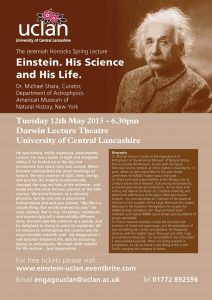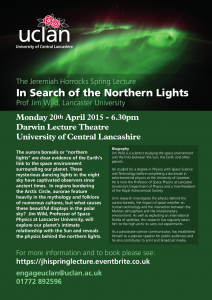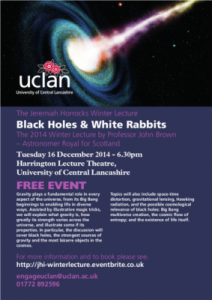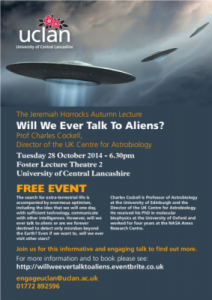Lancashire Science Festival – June 25th-27th 2015
More details to follow in the near future http://www.lancashiresciencefestival.co.uk
Einstein. His Science and His Life – Tuesday 12 May, 6.30pm
Dr Michael Shara, Curator, American Museum of Natural History, New York
Darwin Lecture Theatre, UCLan

He was daring, wildly ingenious, passionately curious. He saw a beam of light and imagined riding it; he looked up at the sky and envisioned that space-time was curved. Albert Einstein reinterpreted the inner workings of nature, the very essence of light, time, energy and gravity. His insights fundamentally changed the way we look at the universe – and made him the most famous scientist of the 20th century. We know Einstein as a visionary physicist, but he was also a passionate humanitarian and anti-war activist. “My life is a simple thing that would interest no one,” he once claimed. But in fact, his letters, notebooks and manuscripts tell a dramatically different story. Einstein saw the universe as a puzzle, and he delighted in trying to solve its mysteries. All he needed to contemplate the cosmos was his most valuable scientific tool – his imagination. I will describe Einstein’s life, and his enduring legacy to astrophysics. No math skills needed for this lecture… just imagination.
Biography
Dr. Michael Shara is Curator in the Department of Astrophysics at the American Museum of Natural history. Prior to joining the Museum, he was with the Space Telescope Science Institute at Johns Hopkins University for 17 years, where he was responsible for the peer review committees for NASA’s Hubble Space Telescope. Dr. Shara’s principle responsibilities at the Museum are to conduct astronomical research, train young astrophysicists, and build space-shows and exhibitions. He has been both visiting and adjunct professor at Columbia University, and astronomer with tenure at the Space Telescope Science Institute. He currently serves as Chairman of the Board of Directors of the Southern Africa Large Telescope (the largest telescope in the Southern Hemisphere). He curated the
AMNH Einstein exhibition, the “Beyond Planet Earth” exhibition and several AMNH space-shows seen by millions of people worldwide.
Dr. Shara’s research interests include the structure and evolution of novae and supernovae; and the populations of stars inhabiting star clusters and galaxies. He frequently observes with the Hubble Space Telescope and other large ground-based telescopes. He has published over 220 papers in peer-reviewed journals. When not doing research in astrophysics, he can be found scuba diving in the South Pacific, enjoying the company of sharks.
Please contact the orgainser if you would like to book on behalf of a school group or other organisation.
For further information please contact EngageUCLan@uclan.ac.uk, 01772 892596
Please note that The University of Central Lancashire is fully wheelchair accessible and fitted with Hearing Loops throughout. Please contact the orgainser if you wish to discuss any further access, or other, special requirements.
Free car parking will be availble on all university car parks for the duration of the event (please note that Pay & Display Machines will not be operational during this time, so please do not use them).
Darwin Lecture Theatre is located within Darwin Building (labelled as DB on the attached map) – http://www.uclan.ac.uk/visit/assets/2013MapsA4final_portrait_north.pdf
Spring Lecture – In Search of the Northern Lights – Monday 20th April 2015
Prof. Jim Wild, Lancaster University.
Darwin Lecture Theatre, University of Central Lancashire
The aurora borealis or “northern lights” are clear evidence of the Earth’s link to the space environment surrounding our planet. These mysterious dancing lights in the night sky have captivated observers since ancient times. In regions bordering the Arctic Circle, aurorae feature heavily in the mythology and folklore of numerous cultures, but what causes these beautiful displays in the polar sky? Jim Wild, Professor of Space Physics at Lancaster University, will explore our planet’s intimate relationship with the Sun and reveals the physics behind the northern lights.
Jim Wild is a scientist studying the space environment and the links between the Sun, the Earth and other planets. He studied for a degree in Physics with Space Science and Technology before completing a doctorate in solar-terrestrial physics at the University of Leicester. He is now the Professor of Space Physics at Lancaster University’s Department of Physics and a Vice-President of the Royal Astronomical Society. Jim’s research investigates the physics behind the aurora borealis, the impact of space weather on human technology and the interaction between the Martian atmosphere and the interplanetary environment. As well as exploiting an international flotilla of satellites, this research has regularly taken him to the high arctic to carry out experiments. As a passionate science communicator, has established himself as a popular speaker for public audiences and he also contributes to print and broadcast media
For further information please contact EngageUCLan@uclan.ac.uk, 01772 892596
To confirm your attendance and book, please see https://jhispringlecture.eventbrite.co.uk
Please note that The University of Central Lancashire is fully wheelchair accessible and fitted with Hearing Loops throughout. Please contact the orgainser if you wish to discuss any further access, or other, special requirements.
Free car parking will be availble on all university car parks for the duration of the event (please note that Pay & Display Machines will not be operational during this time, so please do not use them).
Darwin Lecture Theatre is located within Darwin Building (labelled as DB on the attached map) – http://www.uclan.ac.uk/visit/assets/2013MapsA4final_portrait_north.pdf
Winter Lecture – Black Holes & White Rabbits – Tuesday 16th December 2014
John Brown, Astronomer Royal for Scotland.
Harrington Lecture Theatre, University of Central Lancashire
Gravity plays a fundamental role in every aspect of the universe, from its Big Bang beginnings to enabling life in diverse ways. Assisted by illustrative magic tricks, this lecture will explain what gravity is, how greatly its strength varies across the universe, and illustrate some if its properties. In particular, the discussion will cover black holes, the strongest sources of gravity and the most bizarre objects in the cosmos. Topics will also include space-time distortion, gravitational lensing, Hawking radiation, and the possible cosmological relevance of black holes: Big Bang multiverse creation, the cosmic flow of entropy; and the existence of life itself.
John Brown has been 10th Astronomer Royal for Scotland since 1995. He held the Chair of Astrophysics in Glasgow University 1984-1996 then till 2010 was 10th Regius Professor of Astronomy in Glasgow University. He is now Leverhulme Emeritus Research Fellow. He has published around 300 research papers on solar flares, stellar winds, comet-sun impacts and inverse problems. He has held research fellowships in 17 institutions worldwide and won the 2012 Royal Astronomical Society Gold Medal for his solar research. As ARfS he gives frequent talks to a wide range of audiences, often using conjuring to demonstrate exotic phenomena, activities which won him a UK Institute of Physics Outreach Prize. He has wide arts interests and is currently learning alto sax. More info at www.johncbrown.org
Please note that The University of Central Lancashire is fully wheelchair accessible and fitted with Hearing Loops throughout. Please contact the orgainser if you wish to discuss any further access, or other, special requirements.
Free car parking will be availble on all university car parks for the duration of the event (please note that Pay & Display Machines will not be operational during this time).
Harrington Lecture Theatre 2 is located within the Harrington Building (HA in the purple zone on the following map) – http://www.uclan.ac.uk/visit/assets/2013MapsA4final_portrait_north.pdf
October Lecture – Will We Ever Talk To Aliens? – Tuesday 28 October 2014
Prof Charles Cockell, Director of the UK Centre for Astrobiology
Foster Lecture Theatre 2, University of Central Lancashire, 6.30pm
This is a free event open to all. Please RSVP here to confirm your attendance http://willweevertalktoaliens.eventbrite.co.uk
The search for extra-terrestrial life is accompanied by enormous optimism, including the idea that we will one day, with sufficient technology, communicate with other intelligences. However, will we ever talk to aliens or are we forever destined to detect only microbes beyond the Earth? Even if we want to, will we ever visit other stars? Join is for this informative and engaging talk to find out more.
Charles Cockell is Professor of Astrobiology at the University of Edinburgh and the Director of the UK Centre for Astrobiology. He received his PhD in molecular biophysics at the University of Oxford and worked for four years at the NASA Ames Research Centre. He is Director of the UK Centre for Astrobiology. He is author of a number of books, including, Space on Earth (Macmillan), which explores the links between space exploration and environmentalism.
Please note that The University of Central Lancashire is fully wheelchair accessible and fitted with Hearing Loops throughout. Please contact the orgainser if you wish to discuss any further access or other special requirements.
Free car parking can be arranged in advance, please contact the organiser for further information.
Foster Lecture Theatre 2 is located within the Foster Building (FB in the blue zone on the following map) – http://www.uclan.ac.uk/visit/assets/2013MapsA4final_portrait_north.pdf



